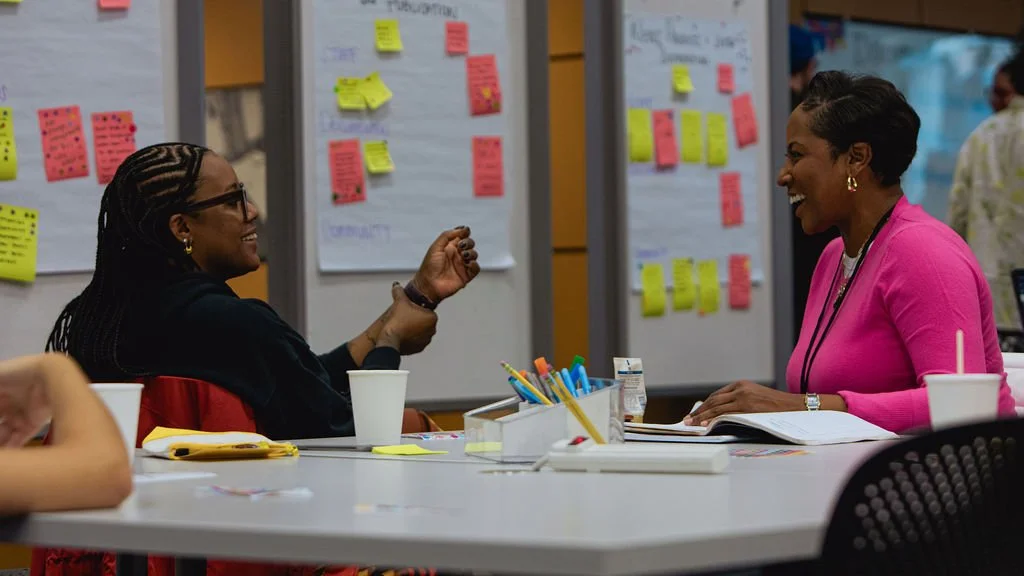3 things we learned by gathering 20 partners from across the country
By Kristina Campa-Gruca
Attendees participating in small group discussions at the 2025 Documenters Summit in Chicago. (Photo: Michael Izquierdo/City Bureau)
Just last month in Chicago, City Bureau welcomed over 40 staff members representing more than 20 communities across the country for our third Documenters Network Summit. As the network expands year after year, this Summit was our largest one yet. It reminded us that in-person gatherings are a force multiplier for deeper impact: they cultivate trust, accelerate learning, and spark coordinated action. In this critical moment for democracy, that kind of connection has never been more important.
Our goals for the Summit were clear and people-focused:
Align around a shared understanding of the Documenters program and its collective vision, including our roles as stewards of this work
Deepen relationships and encourage meaningful collaborations across Documenters sites and with our partners
Share knowledge and build skills across the network so that everyone feels equipped with best practices, innovative tools, and strategies to enhance and sustain their local Documenters program
Collaboratively build action plans toward future success and leave with clear next steps for advancing our collective work
As Director of Documenters Site Success–a new team dedicated to equipping sites with the resources and support they need to launch, sustain, or grow a successful program–I was thrilled to finally get off of Zoom and connect face-to-face with this incredible group. Over three days, I saw the network come to life through deep engagement, organic connection, and spontaneous innovation. I left feeling more motivated and committed than ever before to advancing civic engagement and participatory democracy.
Over 40 staff members representing more than 20 communities gather for Day 2 of the 2025 Documenters Summit in Chicago. (Photo: Ariana Padilla/City Bureau)
Here are three reflections from the Summit I’m carrying forward:
In-person connection sustains and deepens community across the network.
This work is worthy, messy, difficult, joyful, and deeply needed. Moving from Zoom boxes to real-life conversations reminded us all that we are not alone in this work. In fact, we’re stronger when we convene our network through regular engagement.
Many sites told us how isolating it can feel to operate within small community organizations and newsrooms. Often, local Documenters programs are staffed by just one to three people. Gathering in person gave us the space to collaborate and share ideas on everything from how we recruit and engage Documenters to how we innovate on our notes template and manage the day-to-day workflows to support our own sustainability.Sites are reimagining the Documenters model (inform-engage-equip) to meet communities where they are.
Across the network, programs are pushing the boundaries of what civic information access can look like and what Documenters assignments can be. Signal Akron, for instance, sent Documenters into each of its 24 neighborhoods to interview residents and document community stories. Grand Rapids and numerous other sites are experimenting with new ways to share Documenters’ notes through social media, public access television segments, and neighborhood events. These innovative approaches are catalyzing impact across the network and bringing government transparency directly to the people.
Digital equity also emerged as a powerful theme as several sites, particularly rural communities and those with limited internet or digital literacy, explored how to bridge access gaps and engage the most underserved residents. We saw growing curiosity and optimism around the role of technology, from strengthening our foundational Documenters.org platform so that it works better for sites and communities alike, to exploring the potential role and limits of AI tools in alleviating workflow challenges. Our shared position is clear: innovation should always be in service of our communities, and people remain at the heart of this work.We are ready to unleash the full power of the Documenters Network.
The Summit emphasized that we are no longer a small experiment–we’re a nationwide movement for people-powered democracy. Across more than 20 active Documenters programs (with many more emerging!), thousands of trained residents are now documenting and sharing notes on local government meetings across the country.
Together, we’re connecting local stories to national trends and activating Documenters to understand how those trends impact their communities. City Bureau’s Editorial Director, Ariel Cheung, is leading a new network-wide editorial collaboration to trace the local impacts of federal budget cuts through the eyes of Documenters covering budget meetings this season. We recently partnered with local community organizations to lead a network-wide “FOIA and Find Out” training to teach Documenters how to submit a FOIA request. This session was inspired by one of our own Documenters and developed in response to sites’ interest in training their own communities. And amidst the ICE raids, we are conducting network-wide training on how to document ICE activity safely. These moments underscore our collective power to share what we know, respond to urgent needs, and build tools for transparency and accountability.
The network’s collective wisdom is our greatest strength. Each Documenters site brings unique expertise, from local partnerships to storytelling innovations, that strengthen the whole. When we learn from one another and align around shared purpose, we move closer to a future where public information truly belongs to the people. As we plan ahead for 2026 and beyond, our next chapter will be defined by how boldly we share, connect, and act together.
Want to check out more civic reporting from our Documenters Network sites? Take a look at Documenters.org. Plus, learn more here about bringing Documenters to your community.


